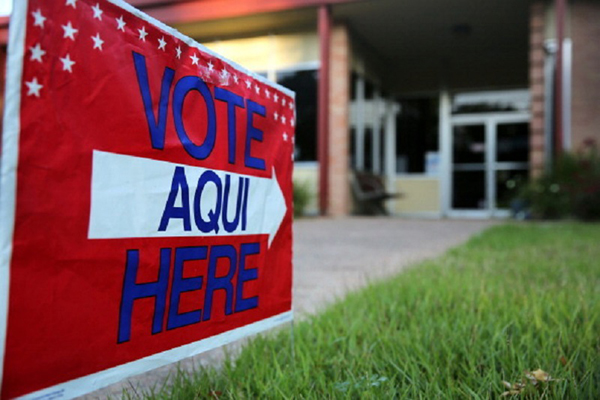- La Feria Community Holds Succesful Business Mixer Event
- Little Nashville to Take Place in Downtown Mercedes
- Lions Basketball Captures District Gold
- La Feria ISD Students Compete in Regional Chess Tournament
- Lions End First Half of 32-4A on a High Note
- La Feria ISD Held Another Successful Parent Conference
- Strong Appearance for Lions at Hidalgo Power Meet
- LFECHS Students Get to Meet Local Actress
- Students Participate in Marine Biology Camp
- Two LFECHS Students Qualify for All-State Band
Texans Face New Voter ID Law for March 6 Primaries
- Updated: January 19, 2018

Texas will be the first state to hold a primary in the 2018 midterm elections, and voters will have to navigate a new Voter ID law that took effect on Jan. 1. Photo: JohnMoore/GettyImages
by Mark Richardson
AUSTIN, Texas – When Texans head to the polls March 6 for the first primary of the 2018 midterm elections, they’ll face a new Voter ID law.
That law, which went into effect Jan. 1, keeps the same list of permissible forms of identification, but allows Texans without a photo ID to vote if they present an alternate form of ID, such as a utility bill or pay stub.
However, according to Beth Stevens, voting rights director for the Texas Civil Rights Project, to use an alternative ID, you’ll have to sign a “reasonable impediment form” stating why you couldn’t obtain a proper ID.
She maintains the form, which sternly warns of the possible penalties for voter fraud, is designed to intimidate minority voters.
“On the reasonable impediment form itself, there’s going to be notice to the voter of, ‘Look, here are the things you could be charged with’ – perjury, or there’s a state jail felony,” she points out. “So, you can imagine as a voter going in and reading that, it can be scary.”
Stevens says the new law was revised last year by the Legislature after the courts struck down the 2011 Voter ID Law.
A federal judge ruled in 2017 that the first law was discriminatory, and is still considering whether state lawmakers passed that law with the intent to discriminate.
And even though the new version of the law is in effect, Stevens says yet another legal challenge could be in the offing.
Stevens says the Texas Civil Rights Project has joined the nonpartisan Election Protection coalition, a national effort to ensure voting rights.
The coalition will have trained volunteers and attorneys answering toll-free phone numbers in English, Spanish and a multi-Asian-language line to assist Texans with any problems they may encounter in the voting process.
“Anyone can call these numbers and ask anything as seemingly mundane as, ‘I don’t know where my polling location is,’ all the way to something more sinister like, ‘I’m in line to vote and I’m being intimidated,'” Stevens states.
She adds the coalition is also training hundreds of observers to place at polling stations across the state to ensure that voting rights are upheld, during both the March primaries and the general election in November.
Early voting for the primary begins Feb. 20.


